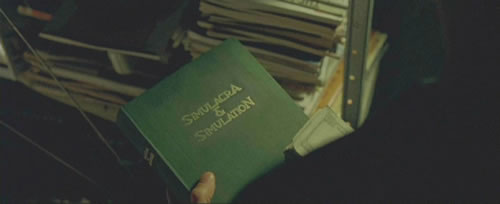« Aujourd’hui l’abstraction n’est plus celle de la carte, du double, du miroir ou du concept. La simulation n’est plus celle d’un territoire, d’un être référentiel, d’une substance. Elle est la génération par les modèles d’un réel sans origine ni réalité : hyperréel. Le territoire ne précède plus la carte, ni ne lui survit. C’est désormais la carte qui précède le territoire — précession des simulacres —, c’est elle qui engendre le territoire et s’il fallait reprendre la fable [de Borges], c’est aujourd’hui le territoire dont les lambeaux pourrissent lentement sur l’étendue de la carte. » —Jean Baudrillard, Simulacres et simulation, p.10.

I’ve just learned via Libération of Jean Baudrillard’s death. Although I have since considered most of his writings fluff, something akin to my generation’s Jean-Paul Sartre, I still must acknowledge that his writings — most especially Simulacres et simulation which I discovered at the impressionable age of 18 — were a major influence.
Here in France, Baudrillard is considered more of a reactionary than a progressive postmodernist as folks back home do. In fact the term postmodernism itself doesn’t mean much here, although in the case of Baudrillard it probably would have some merit. Some of the distain comes from the fact that he sometimes shot at easy targets, such as the self-obsessed world of French « art contemporain » in his infamous polemique (Le complot de l’art) that sent shockwaves through this fragile establishment — given that they were already being attacked on the right by traditionalists and modernists. The same came to pass for other minoritarian mouvements — the gay rights mouvement, example — with Baudrillard sticking his significant protuberance into already messy situations. But to his credit, I think that these ambiguities had less to do with any traditional position on the right-left split, than with his desire to show how two opposing pieces have a tendency to add up and define the same underlying whole. For him, both poles were merely advancing the dissapearance of « the real ». And although I think his use of the term « réel » is about as superficial and nul as the term « Virtual Reality », it still should in the least be taken at face-value. It is not because one is against imperialism that they are for terrorism — the left understands this. Why then did the left have such difficulties with the theory-bombs he liked to throw that were less designed for their destruction, than for their mobilization.
Concerning « Virtual Reality », it is a shame he wasn’t better equiped than his superficial description of all things digital, for example his chapter in Écran total on Deep Blue. Being that he was the author of the postmodern, hyper-reality, and the loss of the real, it was somewhat of a shame (although not all that suprising) he couldn’t find in the hypertechnologies themselves anything else to say than they’re pleasent illusions. So Baudrillard was not the one to understand our paradigm shift to modular machines. He was still blinded (as were many, although not all, of his Mai ’68 contemporaries) by the electronic glitter of the screen.
There is one significant piece of Baudrillardian fluff that I continue to find solice in: his reading of the World Trade Crash, The Spirit of Terrorism. In this text, he redefines the old « spectre haunting europe » (i.e. communism) as the spectre of terrorism haunting the New World Order of the Good (and the Righteous). In this haunting, the equation of Bad is correlate to the equation of Good. Much like Baudrillard’s writing in general, it’s pure vanity — the sort of vanity that constructs very little. The irony of all critiques, he was always at the edge of what he himself critiqued, becoming defined by it. Espace critique nulle. But it is the equivalent of a good detective novel for Parisian dandys as they lounge about on the beaches of the Seine. We, like everyone else, need ours comforts and easy escapes.
Oh, and the above quote from Simulacres et simulation (more or less the starting point for the Matrix), is also pretty lovely, as far as theory-peplum goes. Au revoir, Baudrillard!